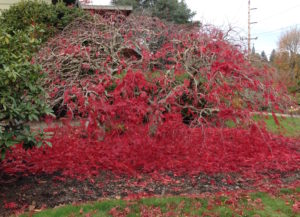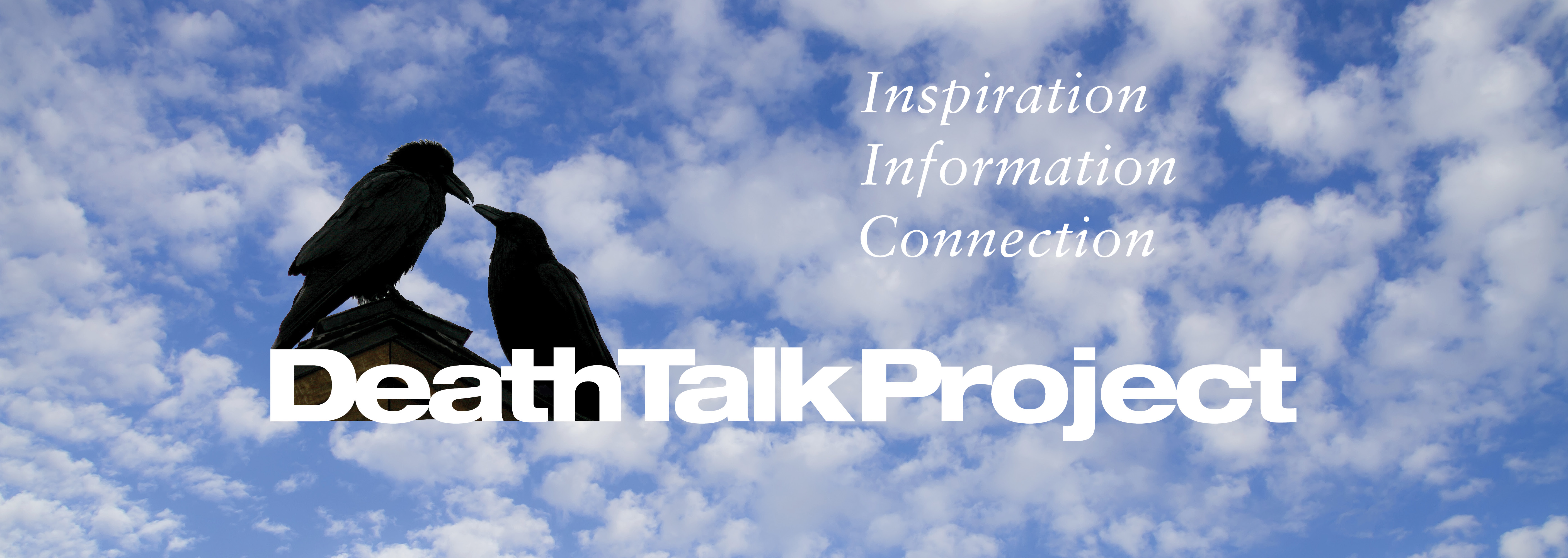Befriending Endings
 What does dying ask of us? Notes from a friend’s death bed, and the words of Stephen Jenkinson
What does dying ask of us? Notes from a friend’s death bed, and the words of Stephen Jenkinson
My friend had been under hospice care for weeks, in and out of consciousness for days. “I don’t know what my dying will look like,” he told an out-of-state caller as I held the phone by his pillow. “Maybe Holly knows.”
I was shocked, and dismayed. This beloved man was 20 years my elder. I had hoped to learn something about dying from him.
We know so little about endings, in the perpetually young, endless frontier culture of the West. The time that might be devoted to befriending the end of one’s days is so often expended on the hope agenda, on “not giving up”.
And so it was with my friend, still hoping for a reprieve, that the dying he was in the midst of was unrecognizable to him.
After the phone call, when he’d been pulled under in the arms of Sister Morphine and then resurfaced into lucidity, I made a gentle inquiry. “You know how you told your caller that you didn’t know what your dying would look like? Is that something you see happening in the future? Or is that something that’s maybe happening now?”
“Oh!” he said, with a tone of wonder. “Maybe you’re right. Maybe that’s what’s happening now.”
Despite the wide-eyed relief in his response and the careful mildness of my question, I felt like I’d delivered a walloping blow. I’d violated the hope conspiracy to which everyone around him had silently agreed. Making his dying recognizable: it carried the mighty weight of the heaviest of taboos.
Of the four deaths in my inner circle in two years time, all under hospice care, every one came as a surprise to many closest to the dying person. “It happened so fast. It happened so fast,” was the disbelieving refrain surrounding the death of two. Another who, like the friend described here, had lain dying for many weeks, gripped my hand less than 12 hours from her last exhale, and made me promise I would “be there for the long haul.”
“The question is not,” Stephen Jenkinson says, “What does dying do to you? The question is, What does it ask of you?”
In an interview earlier this year, Jenkinson offer this response: “Dying asks of you, the willingness to learn endings.” He uses the word befriend deliberately. “I do not mean domesticate. I mean befriend.
“When I say befriend death what I mean is, our obligation is to know death well, to be useful when it comes, to craft a language wherein your dying can recognize itself and is not groping for some kind of foothold.”
How might we develop the capacity to learn death well?
“You had a chance, in the fullness of your days, to practice,” Jenkinson says. “You could have practiced, with all the dying of all the people who died before you. But the only way you could have done it, is to attend to them – a kind of unvanquished alertness to the endings around you.”
In this time of “death positivity” and an exponentially exploding array of providers and programs devoted to “conscious dying,” our awareness is often directed inwards, to making peace with our own emotions, or to exercises to help you to fashion “my life, my death, my way.”
But as Jenkinson cautions in another recent interview, “The lion’s share of dying is not this internal, contemplative reality. The lion’s share of dying is a social and mediated proposition. That’s where the meaning of it actually arises. In other words, not only is your dying not your own, but its very meaning… is a consequence of the family and ultimately the social order in which it is occurring.”
Treating dying as an exercise in self-expression, Jenkinson says, has everything to do with the loneliness of our times.
“The hardest lesson for a North American to learn is that all the big deals of life, not one of them is personal. The more personal you get with these signal features of life, the more banal and constrained and throttled they are – and the less kinship you are able to deeply enjoy with fellow human beings and the made world around you…. It’s in the nature of endings of all kinds that they are the midwives of a human kinship with everything in the world that is other than human.”
When my dying-not-dying friend said that maybe I would know what his (future) death would look like, he could have been referencing the fact that despite my younger years, I’d made choices that had placed me at the bedsides of more dying people than he had. Or that I’d taken some courses. And had hung a shingle out encouraging such conversations.
But in answering the call to learn death as a mystery, as a wolf that won’t be domesticated into a poodle, I’ve found myself less certain, not more.
“It is in the nature of mystery that the more you learn about it, the more mysterious it becomes,” Jenkinson says. “What do we do in the face of this? And the answer is, take a knee. Find some humility. And know dying to be the god that it is.”
With thanks to Stephen Jenkinson and the Orphan Wisdom School, to which I’ve travelled for four years now. I highly recommend Die Wise: A Manifesto for Sanity and Soul (especially the audio version), and Stephen’s new audio recording, Nights of Grief and Mystery, with fellow troubadour Gregory Hoskins.


Great article. Jenkinson is an incredible teacher.
Dear Holly,
Please accept my gratitude and appreciation for this so-well-expressed essay. You have pulled together deep stirrings and wondering – then grounded them in the particulars of the dying days of people with whom you have spent such tender times.
I note that you refer to sharing these words with some around you. May I assume that I may share them with a few others as well? If you’d rather I didn’t please let me know. I have shared them with one close friend. One of his comments: “she’s got it”.
: )
Hi Diane, and thanks for your kind regard. You are most welcome to share the post with others.
Thanks James, for your comment and for your excellent interview.
Only recently have I been made aware of the views of Stephen Jenkinson; yet, your well written essay, Holly strikes me as similar pithy universal insight on a subject inviting reflection .
Thank you, MaryJo
i have lymphoma and have refused further treatment, as i want to be able to enjoy my remaining time (six months to a year, i am told, but i feel that it will be a bit longer than that). after being present at my husband’s home death, i am certain that the last place i want to die is a hospital, and that most of the messages on my Facebook lymphoma group fall into the warrior/You Got This/Fight On territory when not exhorting us all to come to Jesus as God Has A Plan. to which i say that any deity who would plan on inflicting anyone with brain cancer or any of the other deadly and tortuous diseases is not a deity i want in my pantheon, thanks.
the hope industry is making a lot of drug companies rich. one dose of Rituxin costs 11000 US$, and most chemo routines go for six sessions, together with other assorted expensive drugs, and then Rituxin maintainance for years afterward. i was fortunate enough to make my maximum out of pocket expenses early in the year, so have not had to worry about paying for it. but too many people just don’t have the resources. the bone of hope is dangled over their heads, forever unreachable: apparently, life is only for the rich.
can you imagine how that must feel to the parent of a young person with cancer? or to a father of a young family who finds out that he won’t be there to support them?
every day, when i think about my own death, i am deeply grateful that, even with the excruciating experience of caring for a dying husband, bracketed by episodes of my own illness, i will be able to die in my own home, and that in eschewing further chemotherapy i will avoid the debilitating side effects and really be able to confront my death and make my peace with it.
i wish your attitude were more celebrated in our society, as it would make things a lot easier for people who have made the same decision. i will link to this article in my Facebook feed, and hope that it gives people who know me a point of view from which to look calmly at my acceptance of my end, whenever that may be, and know what to say to me other than the ubiquitous thoughts-and-prayers, which, frankly, drive me up a wall even though i know that they are well-meant. i may be dying, but so is everyone else, and the sooner we all realize it the sooner we can get around to actually living.
Valerie, Thank you so much for writing, and for being willing to talk about your dying in a way that we might learn from you, just as your learned from your husband’s death. And so it is that death is not the “end of life” but what feeds life going forward. May your manner of dying, as with the way you have lived, ripple up on untold shores for years to come.
Thank you, MaryJo. Stephen’s work has provided good company and a longer view for my questions about how and why it is in our time, and the troubles I’ve seen at death beds and gravesides.
I just wish to add one small note. As a hospice nurse, I wish that as a society, and individually, we could stop viewing everything as “a battle”. Certainly it is at times, a difficult journey. However…on a spiritual level, death can also be viewed as yet an other “beautiful surrender”. It is with surrender that we can be filled with a sense of awe, mystery, and love of all that we know and do not yet know.
Thank you, Kahlei, for speaking to the awe, mystery, and love that might be better served by surrender than by our current god Control.
Hello Valerie,
Encountering your words here, my soul is reassured.
Please accept my two coins of appreciation and gratitude in support of your journey.
May love’s tenacious comforts protect you,
emile
Holly, what a rich and provocative writing. I’ve listed he parts that especially struck me, and I hope to learn more, especially about Stephen’s call to craft a language in which death can recognize itself. Have you thoughts on what that language would look like?
Other parts that especially hit: “I’d violated the hope conspiracy to which everyone around him had silently agreed. Making his dying recognizable: it carried the mighty weight of the heaviest of taboos.
What does it ask of you?”
“Dying asks of you, the willingness to learn endings.” He uses the word befriend deliberately. “I do not mean domesticate. I mean befriend.
“When I say befriend death what I mean is, our obligation is to know death well, to be useful when it comes, to craft a language wherein your dying can recognize itself and is not groping for some kind of foothold.”
“The hardest lesson for a North American to learn is that all the big deals of life, not one of them is personal. The more personal you get with these signal features of life, the more banal and constrained and throttled they are…
With gratefulness-
Connie